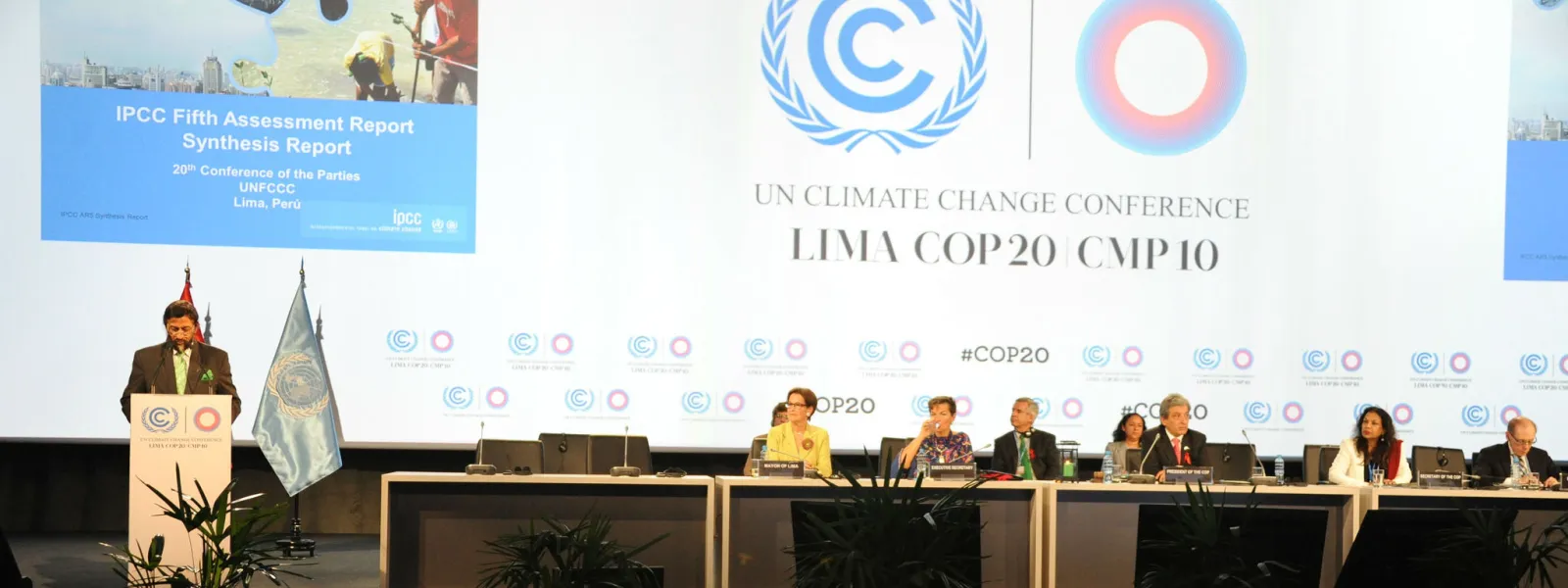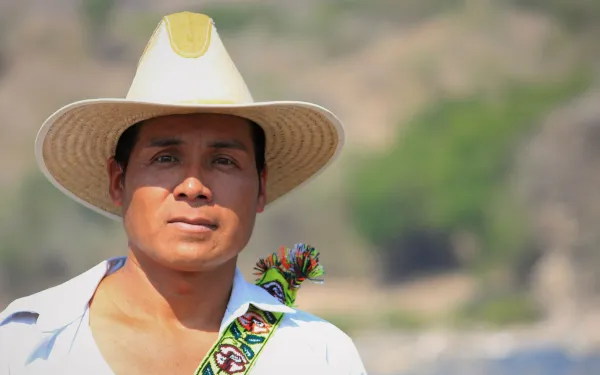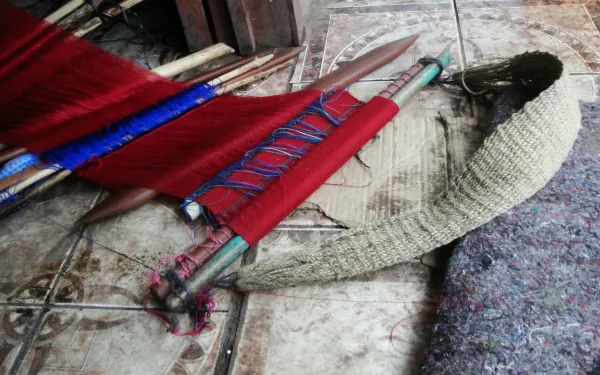
Project
Photo: UNFCCCMonitoring the UN Climate Negotiations
As changes in climate become more extreme, their affects are being hardest felt throughout developing countries. Since 1994, the United Nations Framework Convention on Climate Change has laid out actions to limit the increase of global average temperatures and confront the impacts of climate change.
The States that are Parties to the Convention meet every year in the so-called Conference of the Parties (COP) to review their commitments, the progress made in fulfilling them, and pending challenges in the global fight against the climate crisis.
At COP21 in 2015, they adopted the Paris Agreement, which seeks to strengthen the global response to the climate emergency, establishing a common framework for all countries to work on the basis of their capacities and through the presentation of Nationally Determined Contributions (NDC) that will:
- Limit the increase in global temperatures to 2°C compared to pre-industrial levels and continue efforts to limit it to 1.5°C;
- Increase the capacity of countries to adapt to the impacts of climate change; and
- Ensure that financing responds to the goal of reducing greenhouse gas emissions.
Our focus areas
THE CLIMATE CRISIS AND HUMAN RIGHTS
The climate crisis, due to its transversal character, has repercussions in various fields, geographies, contexts and people. In this regard, the Preamble to the Paris Agreement states that it is the obligation of States to "respect, promote and fulfill their respective obligations on human rights, the right to health, the rights of indigenous peoples, local communities, migrants, children, persons with disabilities and people in vulnerable situations and the right to development, as well as gender equality, the empowerment of women and intergenerational equity."
AIDA at the COP
COP25: Chile-Madrid 2019
At COP25 in Madrid, Spain, we advocated for the inclusion of the human rights perspective in various agenda items. We promoted the incorporation of broad socio-environmental safeguards in the regulation of Article 6 of the Paris Agreement, which refers to carbon markets. We closely followed the adoption of the Gender Action Plan, as well as the Santiago Network, created "to catalyze technical assistance […] in developing countries that are particularly vulnerable to the adverse affects of climate change." We also encouraged the inclusion of ambitious and measurable targets for the reduction of short-lived climate pollutants in the climate commitments of States.
Related projects

Guatemalan indigenous communities file complaint for dams’ damages
Affected communities have called on the Inter-American Development Bank to withdraw funding for the Pojom II and San Andrés dams for failure to comply with its operational policies. The mega-projects have damaged water sources and harmed the livelihoods of local indigenous people, particularly women. Washington, D.C. Indigenous communities affected by Guatemala’s Pojom II and San Andrés dams have called on the Inter-American Development Bank to withdraw its investment in the mega-projects. A complaint filed before the Bank’s independent accountability mechanism explains how the serious social and environmental damages caused by the planning and construction of the dams resulted from the projects’ failure to comply with the Bank’s operational policies. The communities are represented by the Interamerican Association for Environmental Defense (AIDA), the International Platform Against Impunity, and the Plurinational Ancestral Government of Q’anjob’al, Popti, Chuj and Akateko. “The damages caused by the projects’ implementation are the result of non-compliance with the Bank’s operational policies, particularly its policies on environment and sustainability, indigenous people, gender, and information disclosure,” explained Liliana Ávila, AIDA attorney. The complaint details how the dams were authorized without adequate community consultation, and how those affected did not receive sufficient information on the risks. In addition, community members who have peacefully resisted the projects have suffered attacks, threats, and harassment; in 2017, they reported the murder of one local resident, which has yet to be resolved. The construction of the dams has also caused severe environmental damage, including water scarcity and pollution, which have affected local people’s ability to fish, grow food, and maintain their tradition lifestyle. The affected people of the microregion of Ixquisis, in the department of Huehuetenango, are primarily indigenous Mayans including the Chu, Q’anjob’al and Akateko ethnic groups. “The damages from the dams are differentially suffered by women, since they are the primary managers of water use in their homes,” said Anabella Sibrián from the International Platform Against Impunity. “The women of Ixquisis face stigmatization and live in fear of retaliation for their peaceful opposition to the projects.” The Pojom II hydroelectric plant is operated by Generadora San Mateo S.A, while San Andrés is run by Generadora San Andrés S.A. Both are subsidiaries of Promoción y Desarrollos Hídricos S.A., a Guatemalan company. In 2013, IDB Invest, a private arm of the Inter-American Development Bank, approved loans of up to $9 million USD for the construction of Pojom II and up to $6 million USD for the San Andrés project. “We our hope that the Bank’s accountability mechanism confirms the projects have violated internal policies and thus recommends that IDB Invest withdraw its investment from these harmful mega-dams,” Ávila said. The Ixquisis communities were recently awarded the 2018 Front Line Defenders award for Human Rights Defenders at Risk for their valiant, peaceful struggle to defend their water and their territory. Find more information on the case here. Press Contact Victor Quintanilla (México), AIDA, [email protected], +521 5570522107
Read more
Why we work to protect human rights in Latin America
The attorneys who make up AIDA’s Human Rights and the Environment Program work to protect people and communities whose rights have been violated or are at risk from the degradation of their natural environment. They know that there is an undeniable connection between the full enjoyment of human rights and a healthy environment. Here’s why they do what they do: “I DO IT BECAUSE IT’S IN MY BLOOD.” Astrid Puentes, AIDA Co-Director “I work in defense of the environment and human rights because they are essential aspects of life, and they are linked. I do it because it’s in my blood: my father was a farmer, my grandparents and great-grandparents too. Part of my connection with nature comes from my family; it’s my inheritance. I’ve always wanted to contribute to making the world better, particularly in my home country of Colombia, which has so many natural resources but also so much social injustice. I dedicated my career as an attorney to helping make my country a better place. When I became a mother, that motivation only grew, and now I feel a great responsibility to do everything I can so that my children will have a better planet.” Early in her career, Astrid helped stop a proposal by the Colombian and United States governments to spray a transgenic fungus on the Amazon, which would have seriously damaged a vital ecosystem that many people depend on. It was the first successful case in which Astrid was directly involved. “I DEFEND HUMAN RIGHTS BECAUSE I BELIEVE THAT DIGNITY AND EQUALITY ARE INALIENABLE RIGHTS.” Liliana Ávila, Senior Attorney “I defend human rights because I believe that dignity and equality are inalienable rights. I believe in the value of differences and in the struggles of those who have not known their rights. These convictions have made me feel indignation, shame, and rage for the way rights human rights have been infringed upon in my country — Colombia — as well as in Latin America and the world at large. I defend human rights because, for me, they are the realization of the human aspiration to build a more just world.” Last May, Liliana was moved by the story of an indigenous woman in Guatemala whose community depended on a nearby river, which was suffering water shortages due to the construction of a dam. With the water from that river, the woman watered flowers in her garden, which brought her happiness when life made her sad. That story filled Liliana with hope because she knew that, though her work, she could help keep those flowers blooming. “MY GREATEST MOTIVATION COMES FROM MY AWARENESS OF INEQUALITY AND INJUSTICE.” Daniel Iglesias, Fellow “My greatest motivation comes from my awareness of the inequality and injustice that characterize the modern world, in large part due to the effects of global capitalism. It is our responsibility to fight to eliminate those inequalities. Defending human rights through solidarity and by denouncing injustice is a fundamental way to achieve that goal.” As a human rights attorney, Daniel come face-to-face with injustices such as indigenous communities being stripped of their land, people deprived of their freedom of expression, and those who have been affected by the damages caused by extractive industries. Those experiences inform Daniel’s work with AIDA in Mexico, and feed his desire to continue working for social and environmental justice in the region. “I GREW UP knowing I HAD RIGHTS.” Marcella Ribeiro, Legal Advisor “I grew up knowing I had rights. I knew I would never lack food or water and that the beach in front of my house in Brazil would never be polluted because I had the right to a healthy environment. But when I learned that people living in favelas and those affected by droughts didn’t know they had rights, and didn’t organize to claim them, I decided to devote myself to fighting so their voices are heard and their humanity is recognized.” Marcela worked in Brazil’s favelas educating residents about their human rights. Since then, she has understood that social justice will always be possible as long as people are allowed to enjoy their social, cultural, economic and environmental rights.
Read more
Statement on the denouncement of violence against communities in Guatemala
Communities in northwest Guatemala publicly denounced repression and intimidation following peaceful demonstrations against the presence of the National Police and Army in their territory. The people of the microregion of Ixquisis, in the department of Huehuetenango, are currently living in fear due to the improper use of criminal law against those who have expressed their opposition to the development of the Pojom I, Pojom II and San Andrés dams. Together with allied organizations, AIDA has denounced before the Inter-American Commission on Human Rights the worrying criminalization of human rights defenders who oppose the hydroelectric projects in Guatemala. As an organization that works in defense of human rights and the environment in Latin America, AIDA would like to express the following: The repression of freedom of association and expression is extremely worrisome. The risks faced by the people of Ixquisis and the increased acts of violence against them are alarming. We reject any act of violence or intimidation by private and public security forces against people exercising their individual and collective rights. We likewise condemn any campaign of disinformation, de-legitimization and stigmatization that may arise in response the communities’ peaceful demonstrations. The acts that have been denounced not only violate basic rights, but also affect social stability and the traditional lifestyle of the communities. AIDA expresses solidarity with the Peaceful Resistance of the Microregion of Ixquisis; and we support their struggle to defend land and water, and achieve environmental justice. We call on the State of Guatemala to: guarantee the full enjoyment of the communities’ human rights; protect those who defend them; carry out diligent actions to investigate recent acts of violence; ensure due process for those who defend their rights before the projects’ advancement; and evaluate the instances of force denounced by the communities. press contact Victor Quintanilla (Mexico), AIDA, [email protected], +52 5570522107
Read more